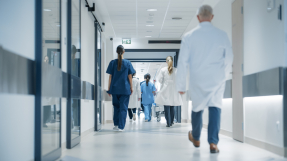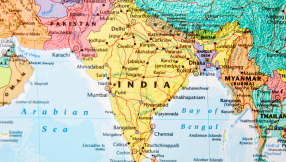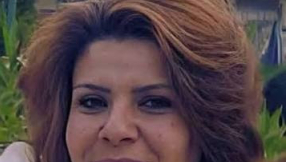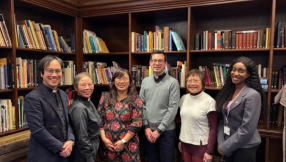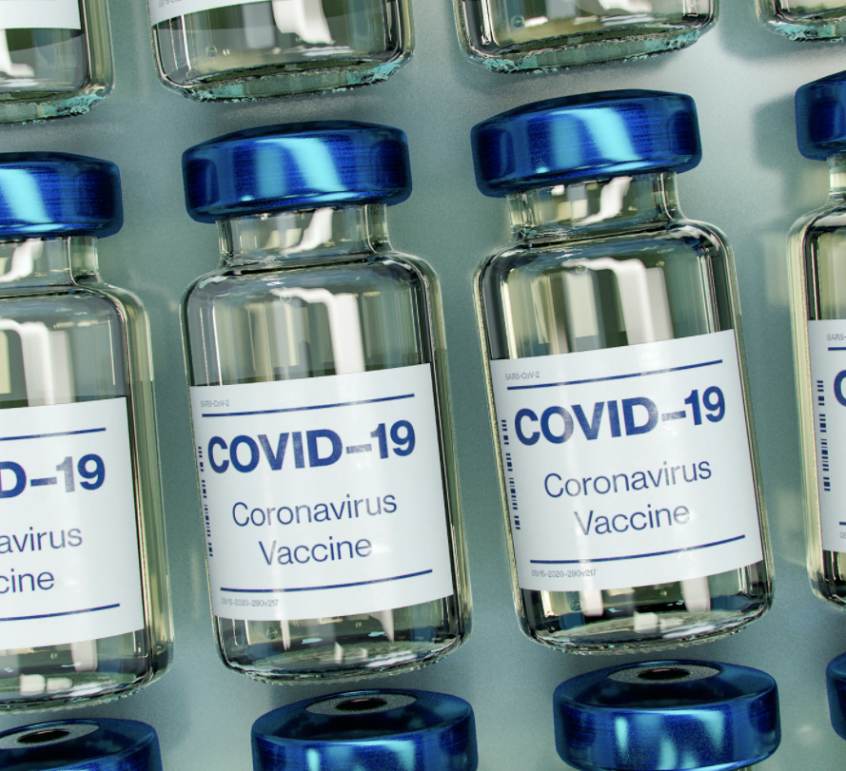
Dr David Boan has just been appointed as the World Evangelical Alliance's Permanent Representative to the World Health Organization (WHO).
He comes to the role at a critical time as the world tries to break free from the shackles of Covid-19.
He speaks to Christian Today about the Covid-19 vaccine, the threats posed by variants and future pandemics, and the role the Church has to play in helping the world defeat the virus.
CT: You've just become the WEA's Permanent Representative to the World Health Organization. Will the work involve advancing the WEA's beliefs?
Dr Boan: It is definitely advancing the belief that our spiritual life is an essential aspect of overall health, and the church has an essential role in the health of individuals and the community. At the most basic level, the issue of health and healthcare broadly defined have not been as well developed in the WEA as other areas and so this appointment represents increased attention to and the beginning of a further development around not just the role of the WEA in terms of health but more importantly the role of the Church.
So we are looking at developing resources, education and support for evangelical alliances that expand how the Church sees its role in health both within its own sphere and within the community at large.
My appointment to WHO is really a first step in that expanding strategy. The connection with WHO is really a two-way street. On the one hand, it involves advocating on the part of the evangelical community to WHO and making WHO aware of the needs, concerns and perspective of the evangelical community. But it flows the other way too because where there are important and valuable resources coming out of the WHO, we can help to explain more about those and the work of the WHO.
CT: The pandemic must be taking up a lot of the focus right now?
Dr Boan: The pandemic is the main focus, so much so it is taking away from other needs. The WHO is part of the global Covax programme which is working to increase the supply of vaccines for the majority world. There is only so much capacity for vaccination, and the focus on Covid is draining resources from other needs, such as childhood vaccination. The pandemic is one of the things we are working on right now and I am in the midst of organising materials for the WEA Covid website around vaccine equity and justice and related programmes like the Love My Neighbour in Canada that are advocating 'get one, give one'.
We're focusing a lot on countries like the US that have an enormous supply of the vaccine, and high rates of vaccination, and what we're saying to them is: you have a wealth of resources and there is an inequity in the world so let's consider that injustice, and if you are benefiting from that vast supply, then please consider contributing to those who do not have that access.
CT: Do you think there is openness to that message?
Dr Boan: In Canada, for example, thanks to the work of my colleagues Christine MacMillan and Sara Hildebrand, they have had a tremendous response to that programme not only in the faith community but in inter-faith areas and with non-faith groups and private enterprise. The message has really resonated with a number of people.
CT: Do you think the pandemic could lead to a turning point in how inequity in the world is addressed?
Dr Boan: It's an encouraging step but it would be very optimistic to say that broadly we are finally beginning to face up to the inequity in the developed world and majority world. At the same time as this encouraging development, we have seen things like the backlash against Asian people who have been stigmatized in the pandemic, and the rise in xenophobia that is related to that. So I think it's a very mixed picture right now, but the response to the Covax programme, and asking people to remember that we need everyone to be vaccinated, has been good. We really do need everyone to be vaccinated!
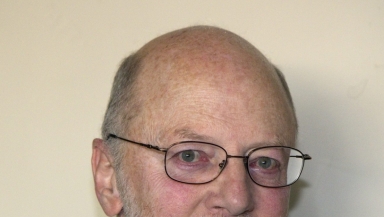
CT: Some people who don't want to take the vaccine are 'anti-vaxxers' but others are people who are genuinely concerned or scared to take the vaccine. What would you say to people who don't trust the vaccine?
Dr Boan: That's a big issue and when you look at it globally, it's a relatively diverse issue. In some parts of the world, there is a history of exploitation, including medical exploitation, which generates mistrust. And I think we need to understand that context because to put pressure on people to be vaccinated could easily backfire.
Then you have other people who generate misinformation and turn some of these things into conspiracies. In the extreme, they might claim things like microchips are in the vaccine. Or it becomes theologically distorted, with people saying that the vaccine is the mark of the beast! We need to steer people away from these theological statements that make no sense.
So the issues are quite diverse.
CT: In addition to distrust towards the vaccine, there seems to be some distrust towards the WHO itself.
Dr Boan: There will always be people who don't trust big global organizations and those organizations do get it wrong from time to time, so I wouldn't criticize people for being cautious about the vaccine or the WHO. And waiting to see what happens as the vaccine rolls out does make sense because it is new. Even the mRNA strategy with the vaccine is new. So you could say that a cautious person is simply acting reasonably, but they are also taking a risk by delaying the protection of the vaccine, for themselves and the community. All of us need to decide how we will balance those risks.
On the other hand, if there is caution for too long, then there is both a community risk from the low numbers of people being vaccinated and a personal risk. For example, there may be side effects from the vaccine but the fact is that even if you were to contract the virus after being vaccinated, the likelihood of dying is extremely low. So you are taking a greater personal risk by not being vaccinated.
CT: The concern here in the UK is very much about the variants and these possibly undermining the vaccine. Are you concerned about the variants too?
Dr Boan: Yes, very much so, and I think that's an important point for people to understand, because we're really in a race and that race is to get a large number of people vaccinated, which then slows the rate of the virus, because it's as the virus spreads that it mutates. So the more of those mutations there are, the greater the likelihood that vaccines will be less effective, and that's why we need to look at generating different vaccines. So the longer the pandemic goes on, the greater the risk of serious mutations and the pandemic becoming a long-term challenge.
CT: Pharmaceutical companies have not always been held in the highest esteem, but when the pandemic came along, AstraZeneca for example pledged 170 million doses to Covax and made a 'no profit' pledge. Would it be too optimistic to hope that the pandemic has opened the door for a fairer distribution of medicines between richer and poorer countries?
Dr Boan: I can't speak to the global view, but I think it's right to say that pharmaceutical companies in the US are not held in high regard. They are extraordinarily successful and profitable, but especially at a time when there are people who are not getting the care they need, it's difficult to see one sector reaping some high profits.
That being said, I think the pharmaceutical companies' development of the vaccine has been remarkable - and the science that's gone into it. That's not only to the credit of pharmaceutical companies; government also funds a lot of that research, and so it's very much the government support for this research and allowing the pharmaceutical companies to really get into the development that's enabled this success.
The test is whether some of these pharmaceutical companies will relax licensing laws so that other companies in the majority world will be able to manufacture the vaccine at a low cost. That's going to be the real test because that would indicate a willingness to surrender a certain amount of profit.
But that's going to be important long-term as well because it's not just a matter of making more vaccines and having supply available, but it's also a question of price. As the Covax programme purchases vaccines, the higher the price then the fewer they can purchase. So it relates directly to the issue of having sufficient supply. The companies holding the licenses for the vaccines face a choice between profit and equitable distribution. That is a point where the Church can advocate for vaccine justice.
CT: Thinking about going forward, the mental health impact is another big issue. How can churches help their communities with the long-term mental health impact of this pandemic?
Dr Boan: When we talk about mental health impacts, I would also include neurological impacts because those are related and perhaps not well recognised. Certainly there are general mental and emotional impacts from the isolation. There's been concern about suicide rates but being isolated doesn't in itself make people suicidal. Nor does being stressed. But stress and isolation will exacerbate existing conditions and so especially among those who are more vulnerable with mental health issues, this pandemic has been an additional burden. And so we will see an increase in mental health impacts. What we can do is increase our support and monitoring of people at risk. Again, there is an opportunity for the local church to educate people about the risks and advocate for support for people with mental health needs.
We also need to know that the neurological impacts of covid infection tend to unfold over time. In the Spanish Flu pandemic in 1918, there were significant neurological impacts on people who contracted the flu and they tended to unfold over several months and even years. Among people who developed moderate to severe systems, it accelerated the dementia process as well as other specific neurological symptoms.
As you may know, with Covid-19, people have tended to lose taste and smell and that's a neurological impact. There is also an increased risk of stroke. So we are going to be seeing the neurological impacts from this pandemic for some time, even after it's over. There will be consequences not only for the individual but for the health system too, with an increased burden mainly among the elderly population.
The elderly are at an increased risk of contracting the virus, experiencing severe symptoms, and suffering neurological impacts. So it's a triple threat for the elderly and we're going to be dealing with that for some time. That in turn will impact families and family caregivers.
CT: Will long Covid play into all of that too?
Dr Boan: Yes, there are things we are still learning about this virus and sadly there are people who are experiencing this for a long time.
CT: There has been talk already of the next pandemic, and just last week for example the UK Government launched its International Pandemic Preparedness Partnership. How real do you think that threat is and how ready do you think we need to be?
Dr Boan: The threat is very real as the population expands and if there are more interactions between animals that could develop different viruses that then mutate and transfer over to people. So yes, it's a very big risk.
Basically, it's human behaviour and our contact with one another that spreads viruses. The world is a very mobile place and as we saw in this pandemic, it's easy for viruses to move around the world quite quickly.
So we have by no means seen the last of this and that's why the distrust in public health is really concerning, because the public health strategies got it right: we needed limits on travel; we needed to wear face masks; we needed to be aware of our own behaviour and how that transmits this. If people don't trust that very basic, well-established science then the flu has an ever greater opportunity to spread.
CT: Is there a role the Church can play in all this?
Dr Boan: I think the Church has an important role to play as a trusted source. They can make people aware of the risks and they are connected to vulnerable populations and the people in need. So they have a role to play in monitoring those needs, providing support for the people experiencing them, advocating for them in terms of services and so on, and speaking out against the stigma that people with mental health struggles experience.
There are of course spiritual aspects of mental health, which we see in all the questions people have, like: why did I get sick? Why is this happening? Where is God in this? Am I being punished?
What's troubling is that the lockdown separated people from their faith communities right at the time they needed that spiritual support the most. We know that when people are struggling spiritually or with their mental or physical health, being able to connect to their faith community can play a very important role in helping them get through these struggles. And yet right at the time we most needed to connect with our fellow Christians, the pandemic made it the most difficult to do so.
So the Church really needs to do what it can to keep connected to people, maintain that sense of community and build those emotional supports. For example, my own church here in Idaho has started Mental Health Mondays, which brings people together in online groups to talk about how they are doing. We also initiated a system of proactive checking in with people, with special attention on the most vulnerable and making sure people are not forgotten. The focus is on peer support and providing a space where we can share our struggles and talk with our Christian peers about how things are going.
But whatever the Church does, we certainly do need to get ready and learn some lessons from this pandemic, because the next one will happen.










